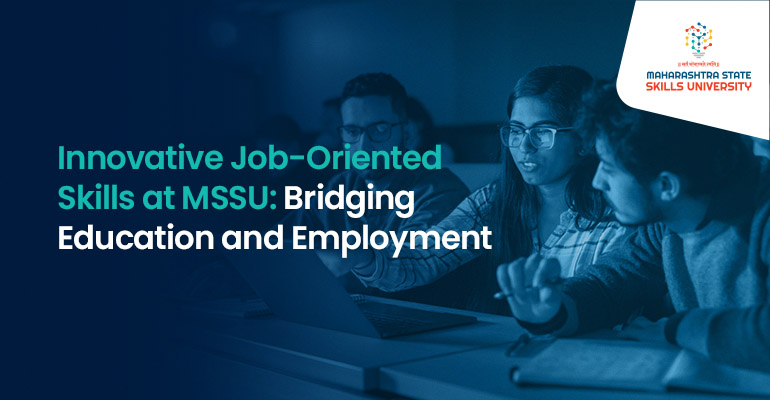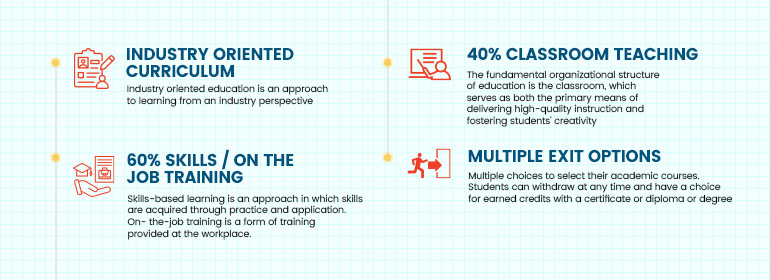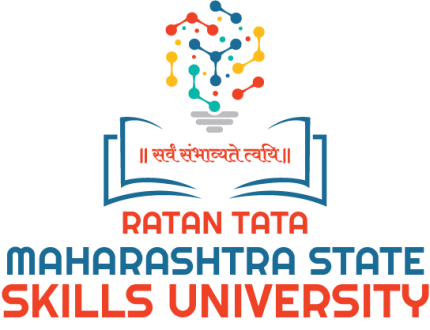Innovative Job-Oriented Skills at MSSU: Bridging the Gap Between Education and Employment
July 25, 2024 2024-07-29 17:08Innovative Job-Oriented Skills at MSSU: Bridging the Gap Between Education and Employment

Countries around the world are addressing the issue of how education relates to employment opportunities. Not only that, but the number of educated jobless people increases significantly when the employment market slows down due to economic volatility. Nearer home, the situation is dire, with an approximate 4.80% unemployment rate at year’s end. India’s literacy rate is also somewhat uneven, with various states having varying percentages. However, the total proportion is a concerning 74.04%. These figures demonstrate the necessity of integrating employability and education.
In a poll, 54% of Indian students said that their postsecondary education had increased their career prospects. Simultaneously, 53% of Indian companies believe that a serious skills shortage is the cause of the high entry-level unemployment rate. Furthering “serious problems in terms of cost, quality, time,” and other issues, is this kind of incompetence. Given these numbers, it is crucial to comprehend what leads to this circumstance and how the education gap that exists between our children and the employment opportunities that allow them to use it may be closed for the mutual advantage of everyone involved.
Principal Causes of Unemployment
The unemployment rate in rural regions is greater than in metropolitan areas across all educational levels. The main cause of this is that, after seeing how much better life is in the city, the son of a farmer no longer wants to remain in his village and continue working in the fields. But not everyone can find employment right once after moving here, and some even wind up taking on menial jobs to make ends meet.
Alternatively, he may benefit from a vocational training program or an academic degree in something like agriculture. He may make himself employable by putting what he has learned into practice. It is also crucial to create work possibilities in the rural economy. By building a robust cottage industry, young people may integrate their expertise with earning a living and enter mainstream employment.
Industrial Education
This leads us to the next interconnected industrial training component. In India, there are not many institutes that provide kids with practical technical training. The majority of universities simply provide a set curriculum, which is essentially learning from textbooks. As a result, after graduating, students are unable to immediately use the knowledge they have learned to meet the expectations of the business. Companies are unable to invest time and resources in teaching new hires the fundamentals of technical skills in the present competitive market.
If only the educational system itself equips students with the skills necessary to handle professional settings, they will have a greater demand for jobs. It also means providing industrial training to the instructors. To achieve this, legislators for education must collaborate with industry professionals to design a curriculum that strikes a balance between textual content and application. Students will be in a better position to make the correct kind of effort once they understand the practical significance of their education. This will contribute to the development of the appropriate employability that our nation sorely needs.
Technology Enablement in Education
Enhancing the integration of technology into the regular educational framework is an additional aspect that warrants consideration. With the way the world is changing and the work market changing as well, having in-depth knowledge of technology breakthroughs is becoming increasingly important. India is a worldwide hotspot for accessible talent at lower costs. Incorporating skills to expose students to real-time applications and lowering the cost of incorporating technology and multimedia into the core curriculum would significantly improve students’ access to holistic education and increase their chances of finding work. MSSU has been instrumental in assisting young people in finding work. For young people who are looking for work, our job-oriented programs should be an excellent place to start.
When asked how our educational system can help the Indian employment sector, the former president of India and eminent scientist Dr A.P.J. Abdul Kalam once said, “The education system must stress the importance of entrepreneurship; banking system should provide venture capital; and lastly, entrepreneurs should produce competitive products.” It is intriguing to consider how combining these three suggestions would benefit this nation’s future residents.
Competency-based learning and technology-enabled flexible learning alternatives are being experimented with in high schools in countries including Finland, the Netherlands, New Zealand, and several US states. In a nation like India, where thirty percent of the population is under the age of eighteen, job possibilities and individualized education based on interests and talents must be addressed. It becomes urgent in this environment to innovate educational models and adapt to the new career and livelihood paths made possible by technology.
Given the diversity of requirements among our states and various demographic segments, we must prepare for many pilot programs across the nation. We require motivated educators to lead by example in developing innovative, effective teaching approaches that will serve as the cornerstone for this country’s future.

The Attempt of Maharashtra State Skills University(MSSU) for Bringing The Change
Maharashtra State Skills University (MSSU), established by Maharashtra Act No. VII of 2021, aims to provide holistic skill training to the state’s youth, making them employable through recognized skill-based higher education programs. Our mission is to solve real-world problems for a better tomorrow. We offer an industry-oriented education model with 40% classroom teaching and 60% skills/on-the-job training. Classroom teaching delivers high-quality instruction and fosters creativity, while skills-based learning ensures practical, hands-on experience at the workplace. MSSU prepares students for the modern workforce by combining traditional education with practical training.
The Offerings of MSSU
School of Science Engineering and Technology Skills
By developing a significant hub of learners focusing on skill-based learning, MSSU’s School of Science Engineering and Technology Skills aims to create new standards in skills-based education through STEM education, developing multidisciplinary human capital to lead technical positions in the industry. Through the university’s educational process, this school will also concentrate on producing highly influential researchers who possess the critical thinking skills necessary to tackle challenging issues and offer answers. MSSU will serve as a point of entry for students wishing to pursue jobs in science and technology both domestically and abroad.
Under Graduate programs
- Diploma/ BVoc/ B.Tech Computer technology
- Diploma/ BVoc/ B.Tech Mechatronics Engineering
- Diploma/ BVoc/ B.Tech Information technology
- Design (Gaming/ Animation/ Industrial Design)
- Healthcare Courses
Postgraduate Programs
- PG Diploma/ M.Tech (Cloud Computing and DevOps)
- PG Diploma/ M.Tech (Cyber Security)
- PG Diploma/ M.Tech (Data Science & AI)
School of Commerce & Management Skills
The School of Commerce & Management Skills provides knowledge and skill-based learning through its various undergraduate and post-graduate programs to the students to produce both: professional manpower in line with industry demands, and entrepreneurs who can pioneer the start-up ecosystem. The school has taken a multi-disciplinary approach to its courses and emphasises practical, on-the-job training to equip the students with the requisite skills and knowledge of ground realities to succeed as managers as well as entrepreneurs.
Undergraduate Programs
- Diploma/ BVoc/ BBA
- Diploma/ BVoc/ BBA Hospitality / Restaurant Management
- Diploma/ BVoc/ BBA Facility Management
Postgraduate Programs
- PG Diploma/ MBA
School of Humanities Skills
The School of Humanities Skills (SHS) strives to cultivate graduates highly sought after in both corporate and non-profit sectors, as well as research fields, equipped with robust critical analysis, communication, and language proficiency. SHS adopts an interdisciplinary and practical approach to liberal arts education, offering students experiences that transcend conventional academic boundaries, fostering a solid foundation of skills essential for their professional journeys.
Undergraduate Programs
- Diploma/ BA/ BA Hons – Economics and Psychology
Our shared goal is to find practical solutions to current issues so that tomorrow might be better. Check out our specialities and course modules, then join right now to expand your job opportunities both domestically and abroad!
Frequently Asked Questions
MSSU’s focus on skill-based learning, practical training, and industry collaboration sets it apart. The interdisciplinary approach, technology integration, and innovative teaching methods prepare students for a dynamic job market, ensuring career readiness.
MSSU provides state-of-the-art laboratories, modern classrooms, advanced technology-enabled learning environments, extensive library resources, and career services. These facilities support hands-on training, research, and student development.
MSSU ensures quality through collaboration with industry professionals, continuous curriculum updates, and practical training. Faculty receive ongoing training, and student and employer feedback is used to refine programs, maintaining high educational standards.
MSSU graduates can expect job opportunities in science, technology, commerce, management, healthcare, and more. The university’s industry-aligned curriculum and practical training ensure graduates are equipped with skills in demand by employers.
Eligibility criteria for MSSU programs vary by course. Generally, undergraduate programs require completion of higher secondary education, while postgraduate programs require a relevant bachelor’s degree. Specific requirements are detailed on the MSSU website.
STEM education at MSSU develops multidisciplinary human capital capable of leading technical roles in various industries. It emphasizes critical thinking, problem-solving, and technical expertise, preparing students for innovation and leadership in science and engineering.
SSETS at MSSU offers Diploma, BVoc, and B.Tech programs in Computer Technology, Mechatronics Engineering, Information Technology, and Design (Gaming/Animation/Industrial Design). These programs emphasize both theoretical knowledge and practical skills.
MSSU offers PG Diploma and MBA programs in the School of Commerce & Management Skills. These programs combine theoretical insights with practical experiences, preparing students for advanced careers in management, entrepreneurship, and related fields.
MSSU aims to bridge the gap between education and employment by providing skill-based learning aligned with industry demands. The focus is on practical training, ensuring students are well-equipped to transition smoothly from education to the workforce and meet industry needs.



